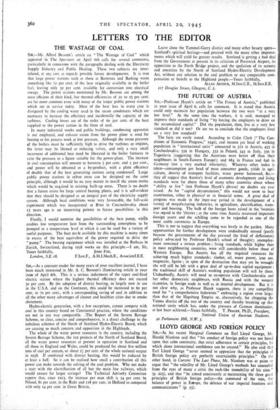THE FUTURE OF AUSTRIA
Sin,—Professor Hayek's article on " The Future of Austria," published in your issue of April 6, calls for comment. It is stated that Austria could only maintain her population between the two wars " at a very low level." At the same time the workers, it is said, managed to improve their standards of living " by forcing the employers to draw on the accumulated capital." Did the population, then, live at, a very low standard or did it not? Or are we to conclude that the employers lived on a very low standard?
The facts are easily stated. According to Colin Clark (" The Con- ditions of Economic Progress," 1940), real income per head of working population in "international units" amounted to 572 in Austria, 455 in Czechoslovakia,' 359 in -Hungary, 352 in Poland, 343 in Italy, 33o in Yugoslavia (suggesting that the Austrians were better off than their neighbours in South-Eastern Europe); and 684 in France find 646 in Germany (not a very marked inferiority). Whatever other index is taken—consumption per head of mass consumer goods, yields in agri- culture, density of transport facilities, water power harnessed, &c.— they all suggest that Austria's level of economic development and living standards were far above those of many other countries about whose " ability to live " (not Professor Hayek's phrase) no doubts are ever raised. As for " capital decumulation," this would not seem to bear examination, either in physical or in financial terms. A great deal of progress was made in the inter-war period in the development of a variety of manufacturing industries, in agriculture, electrification; trans- port and housing. The bulk of the foreign loans raised in the 'twenties was repaid in the 'thirties ; at the same time Austria recovered important 'foreign assets and the schilling came to be regarded as one of the most. stable currencies in Europe.
This is not to suggest that everything was lovely in the garden. Many opportunities for further development were undoubtedly missed (partly because the governments of the day pursued the kind of deflationary policy advocated by Professor Hayek's school of thought); unemploy- ment remained a serious problem ; living standards, while higher than in most neighbouring countries, were still considerably below those of Western Europe. But Austria has all the required resources for achieving much higher standards: timber, oil, water power, iron ore, magnesite, lignite ; in spite of the destruction that may yet be wrought she will still be left with a great deal of up-to-date capital -equipment ; the traditional skill of Austria's working population will still be there. Undoubtedly, Austria will need to co-operate with Czechoslovakia and her other democratic neighbours, with Russia and with the western ccuntries, in foreign trade is well as in internal development. But it is not clear why, as Professor Hayek suggests, there is any compelling need for " a comprehensive federation " embracing a region even larger than that of the Hapsburg Empire or, alternatively, for chopping the Vienna district off the rest of the country and thereby breaking up that national unity which has, under the pressure of German domination, at fait been achieved.—Yours faithfully, T. PRAGER, Ph.D., President,


























 Previous page
Previous page